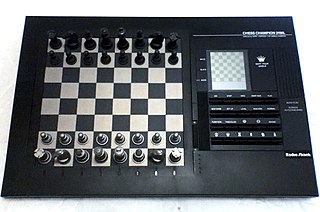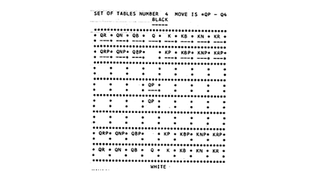Related Research Articles

Deep Blue was a chess-playing expert system run on a unique purpose-built IBM supercomputer. It was the first computer to win a game, and the first to win a match, against a reigning world champion under regular time controls. Development began in 1985 at Carnegie Mellon University under the name ChipTest. It then moved to IBM, where it was first renamed Deep Thought, then again in 1989 to Deep Blue. It first played world champion Garry Kasparov in a six-game match in 1996, where it lost four games to two. It was upgraded in 1997 and in a six-game re-match, it defeated Kasparov by winning two games and drawing three. Deep Blue's victory is considered a milestone in the history of artificial intelligence and has been the subject of several books and films.

Computer chess includes both hardware and software capable of playing chess. Computer chess provides opportunities for players to practice even in the absence of human opponents, and also provides opportunities for analysis, entertainment and training. Computer chess applications that play at the level of a chess grandmaster or higher are available on hardware from supercomputers to smart phones. Standalone chess-playing machines are also available. Stockfish, Leela Chess Zero, GNU Chess, Fruit, and other free open source applications are available for various platforms.
This glossary of chess explains commonly used terms in chess, in alphabetical order. Some of these terms have their own pages, like fork and pin. For a list of unorthodox chess pieces, see Fairy chess piece; for a list of terms specific to chess problems, see Glossary of chess problems; for a list of named opening lines, see List of chess openings; for a list of chess-related games, see List of chess variants; for a list of terms general to board games, see Glossary of board games.

Correspondence chess is chess played by various forms of long-distance correspondence, traditionally through the postal system. Today it is usually played through a correspondence chess server, a public internet chess forum, or email. Less common methods that have been employed include fax, homing pigeon and phone. It is in contrast to over-the-board (OTB) chess, where the players sit at a physical chessboard at the same time; and most online chess, where the players play each other in real time over the internet. However, correspondence chess can also be played online.

Computer Go is the field of artificial intelligence (AI) dedicated to creating a computer program that plays the traditional board game Go. The field is sharply divided into two eras. Before 2015, the programs of the era were weak. The best efforts of the 1980s and 1990s produced only AIs that could be defeated by beginners, and AIs of the early 2000s were intermediate level at best. Professionals could defeat these programs even given handicaps of 10+ stones in favor of the AI. Many of the algorithms such as alpha-beta minimax that performed well as AIs for checkers and chess fell apart on Go's 19x19 board, as there were too many branching possibilities to consider. Creation of a human professional quality program with the techniques and hardware of the time was out of reach. Some AI researchers speculated that the problem was unsolvable without creation of human-like AI.

In computer chess, a chess engine is a computer program that analyzes chess or chess variant positions, and generates a move or list of moves that it regards as strongest.

Zappa, Zap!Chess or Zappa Mexico, is a UCI chess engine written by Anthony Cozzie, a graduate student at the University of Illinois at Urbana-Champaign. The program emphasizes sound search and a good use of multiple processors. Earlier versions of Zappa are free and the current version is available at Shredder Computer Chess.

Kotok-McCarthy, also known as A Chess Playing Program for the IBM 7090 Computer was the first computer program to play chess convincingly. It is also remembered because it played in and lost the first chess match between two computer programs. A pseudocode of the program is in Figure 11.15 of.
Kaissa was a chess program developed in the Soviet Union in the 1960s. It was named so after Caissa, the goddess of chess. Kaissa became the first world computer chess champion in 1974 in Stockholm.

A chess tournament is a series of chess games played competitively to determine a winning individual or team. Since the first international chess tournament in London, 1851, chess tournaments have become the standard form of chess competition among multiple serious players.

Beagle Bag is a collection of video games for the Apple II family of computers published in 1982 by Beagle Bros. It was released in unlocked and unprotected form and is now in the public domain.
A chess rating system is a system used in chess to estimate the strength of a player, based on their performance versus other players. They are used by organizations such as FIDE, the US Chess Federation, International Correspondence Chess Federation, and the English Chess Federation. Most of the systems are used to recalculate ratings after a tournament or match but some are used to recalculate ratings after individual games. Popular online chess sites such as Chess.com, Lichess, and Internet Chess Club also implement rating systems. In almost all systems, a higher number indicates a stronger player. In general, players' ratings go up if they perform better than expected and down if they perform worse than expected. The magnitude of the change depends on the rating of their opponents. The Elo rating system is currently the most widely used. The Elo-like ratings systems have been adopted in many other contexts, such as other games like Go, in online competitive gaming, and in dating apps.

Computer Othello refers to computer architecture encompassing computer hardware and computer software capable of playing the game of Othello. It was notably included in Microsoft Windows from 1.0 to XP, where it is simply known as Reversi.
In chess played with a time control, time trouble, time pressure, or its German translation Zeitnot, is the situation where a player has little time to complete the required moves. When forced to play quickly, the probability of making blunders is increased, so handling the clock is an important aspect of chess playing. The last move of the time control is especially prone to blunders if players only have a few seconds to play it, and many games have been lost due to poor time management in time pressure.
Opening book is often used to describe the database of chess openings given to computer chess programs. Such programs are quite significantly enhanced through the provision of an electronic version of an opening book. This eliminates the need for the program to calculate the best lines during approximately the first ten moves of the game, where the positions are extremely open-ended and thus computationally expensive to evaluate. As a result, it places the computer in a stronger position using considerably less resources than if it had to calculate the moves itself.

Kasparov's Gambit, or simply Gambit, is a chess playing computer program created by Heuristic Software and published by Electronic Arts in 1993 based on Socrates II, the only winner of the North American Computer Chess Championship running on a common microcomputer. It was designed for MS-DOS while Garry Kasparov reigned as world champion, whose involvement and support was its key allure. A Macintosh version was planned to be released in 1995.
Computer Arimaa refers to the playing of the board game Arimaa by computer programs.

AlphaZero is a computer program developed by artificial intelligence research company DeepMind to master the games of chess, shogi and go. This algorithm uses an approach similar to AlphaGo Zero.

Turochamp is a chess program developed by Alan Turing and David Champernowne in 1948. It was created as part of research by the pair into computer science and machine learning. Turochamp is capable of playing an entire chess game against a human player at a low level of play by calculating all potential moves and all potential player moves in response, as well as some further moves it deems considerable. It then assigns point values to each game state, and selects the move resulting in the highest point value.
References
- Levy, David; Newborn, Monty (1991), How Computers Play Chess, Computer Science Press, ISBN 0-7167-8121-2
- Newborn, Monty (1975), Computer Chess, New York: Academic Press